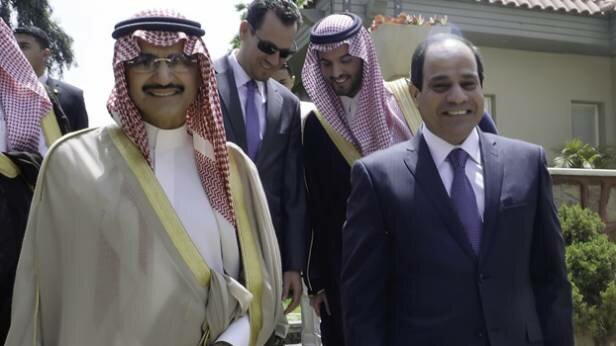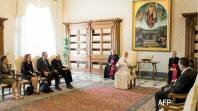A few days ago, Egypt’s likely President-to-be Abdel Fattah al-Sisi praised Saudi Arabia and vowed to forge strong security ties with Arab Gulf states. He said that, “the first country I will visit will be Saudi Arabia and we will go to express our gratitude to the Custodian of the Two Holy Mosques for we will not forget his supportive stances and his statement backing the Egyptian people that led to a change in the [political] equation.”
Sisi also argued that the security in the Gulf region and Egypt were interlinked. He said the security of the Gulf, “is part of Egypt’s security. We will not allow anyone to tamper [with the Gulf’s security]. If there is any threat to any Gulf state, Egypt will not stand and watch.” These comments illustrate the emerging security bloc between Egypt with the GCC and specifically the Kingdom of Saudi Arabia.
The fact that Egypt and Saudi Arabia are strongly supportive of each other is well known. What is more important however is to decipher the mutual foreign policy perspectives both Cairo and Riyadh see in terms of regional security issues. Both countries are planning to stabilize the ‘hot button’ issues of Libya and the future of Islamic discourse regarding the Muslim Brotherhood (Ikhwan) and Salafist-Jihadist extremism in the region and in Syria.
A common concern
The Libyan situation is clearly a concern to both countries. Libya is disintegrating before their eyes especially since Gen. Khalifa Hafter began Operation Dignity a few weeks ago to reverse the tide of Libyan collapse. Cairo and Riyadh see Hafter, who now carries the Egyptian-styled title as head of the Supreme Council of the Armed Forces (SCAF) as the current hope to bring order to Libya by rooting out Islamist forces which are seen as disrupting the geopolitical landscape of the failing state.
Al-Azhar and key Saudi clerics are being enlisted to play a stronger and more potent role in a joint Egyptian-Saudi campaign in countering Muslim Brotherhood and Salafist-Jihadist narratives.
Money and other support is flowing into Hafter and his forces, which now include the entire Libyan military, who have broken ranks with the fragmented leadership in Tripoli, who themselves are former members of the Libyan Islamic Fighting Group (LIFG). As we know well from recent history, LIFG is linked to the predecessor of Al-Qaeda in the 1990s. A Libyan security official argued that the LIFG members in the Libyan government, “are still alive and well and no one in the West pays attention to this fact about them. The Ikhwan are also active which poses a danger to all of North Africa.”
Clearly, Egypt and Saudi Arabia are quite concerned with this development because of the potential for Libya’s woes to spill over into Egypt. Sisi stated that, “over the past two years the North African country has become a nest of extremists and militias.” He vowed that Cairo would not allow any terrorist operation to be launched from inside Libya. That is why, according to an Arab official, there are special operations forces from ‘GCC states’ on the Libyan-Egyptian border.
Turning to religious discourse
Turning to religious discourse, Egypt under President Sisi as well as Saudi leadership see the Muslim Brotherhood and Salafist-Jihadists as a major enduring threat that needs to be tackled. Both countries appear to be seeking to launch a new campaign of attacking the credibility of Takfirist groups throughout the region including Syria and the Sinai.
Sisi argued that, “we are facing the delicate balancing act of preserving Syria while exterminating the terrorist and Takfirist groups that have appeared on the scene.” Al-Azhar and key Saudi clerics are being enlisted to play a stronger and more potent role in a joint Egyptian-Saudi campaign in countering Muslim Brotherhood and Salafist-Jihadist narratives. In addition, the two countries, along with other Gulf partners are campaigning hard to convince the United States and Britain to recognize the threat posed by the resentful and angry Ikhwan members.
Unmistakably, Egypt, and ultimately Saudi Arabia, will never accept a future divided Syrian state where Al-Qaeda groups and the Islamic State of Iraq and Syria (ISIS) can thrive in attempts to link-up with other adherents. According to an Arab official, Al-Qaeda groups and the ISIS are recruiting disheartened Muslim Brotherhood members, training them in preparation for operations against Egypt, Saudi Arabia, and the rest of the GCC states.
An Arab official noted that fliers in support of ISIS have appeared on Saudi streets. Perhaps it is only a matter of time before similar fliers appear in Egypt. This style of communication is hard to track and relies on the simplest of information technologies. Consequently, a campaign against such support measures needs to be launched immediately.
There is no doubt that Egyptian President Sisi along with the country’s GCC allies will be strengthening their collaboration across military and security services including more joint and trilateral exercises on a regular basis to prepare to implement an armed solution to preserve the safety and security of allied Arab states. Intelligence will also play a major role. Arab officials point out that information collection and analysis is more coordinated than ever to deal with coercion. This development is important, and the unity of the states serves as a bulwark against uprisings, riots, and attacks.
Egyptian President Sisi, in this environment, is arriving at the apex of Egyptian politics at an extremely important regional security juncture. Saudi Arabia and its Gulf allies will be building on this momentous event.
Dr. Theodore Karasik is the Director of Research and Consultancy at the Institute for Near East and Gulf Military Analysis (INEGMA) in Dubai, UAE.


















